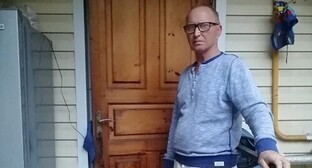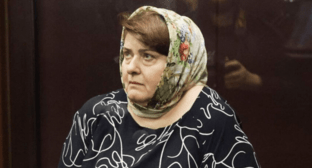25 January 2021, 14:25
Week in the Caucasus: review of main events of January 18-24, 2021
Return of refugees, post-war victims, and search for dead bodies in the Karabakh conflict zone; protest actions held by supporters of Alexei Navalny in Southern Russia; special operation in Chechnya; European Court's judgement on Georgia's claim against Russia, – see the review of these and other events in the Caucasus during the week of January 18-24, 2021, prepared by the "Caucasian Knot".
Return of refugees, post-war victims, and search for dead bodies in Karabakh conflict zone
Refugees continue to return to their homes in Nagorno-Karabakh. According to the Russian Ministry of Defence (MoD), by January 24, with the support of Russian peacekeepers, over 50,000 refugees had returned to Nagorno-Karabakh. The Russian peacekeepers also help to rebuild infrastructure facilities and demine the conflict zone, where unexploded ordnances still complicate the life in the region. On January 19, while searching for dead bodies near the town of Megri, two employees of the Armenian Ministry for Emergencies (MfE) were injured as a result of a mine explosion. On January 22, an Azerbaijani combat engineer was injured while demining the territory in the Djebrail District.
In the zone of the hostilities, rescuers still search for dead bodies. On January 23, the Nagorno-Karabakh MfE reported that the total number of the dead bodies of soldiers found by the Karabakh rescuers after the peace agreement had reached 1256. On January 24, it was reported that Azerbaijan handed over the bodies of other 30 Armenian military personnel to the authorities of Nagorno-Karabakh.
On January 21, the Military Prosecutor's Office of Azerbaijan reported that 2858 soldiers were killed during the escalation of the conflict in the autumn of 2020. The Armenia's losses in the battles for Nagorno-Karabakh did not exceed 4000 people, Armenian Deputy Prime Minister Tigran Avinyan announced on January 20. On January 21, the Armenian Ministry for Public Health reported that the total number of casualties from the Armenian side increased to 3450 people.
Protest actions held by supporters of Alexei Navalny in Southern Russia
On January 23, supporters of Alexei Navalny held rallies throughout the whole Russia, including in the south of the country. On January 17, the oppositionist was detained upon his arrival in Moscow from Berlin. Later, he was arrested. Alexei Navalny is charged with a violation of the rules of conditional sentence. The oppositionist's supporters came to the protest actions despite warnings from the law enforcement bodies. Some activists were detained on the eve of the rallies. In Astrakhan, a two-hour march was held in support of Alexei Navalny. Law enforcers did not interfere with the action, but detained two persons during the march. In Elista, about 100 people gathered for a rally on the territory of the "Pagoda of Seven Days" cultural complex. The participants of the action called it "a walk," and it lasted 1.5 hours and passed without detention. Furthermore, solo pickets took place in different parts of the city. In Krasnodar, several thousand people took part in a march. Protest actions were also held in Yeisk, Novorossiysk, Gelendzhik, and Armavir. In Sochi, dozens of activists were detained without any explanations. One of the detainees was beaten and needed medical help. Detentions also took place in Makhachkala, where law enforcers forced people out of the central square into three buses, although none of the activists unfolded any posters, eyewitnesses said. In total, about 100 people were taken to police stations, including minors. All of them were released by the evening. The police detained activists also in Volgograd, where trials in the detainees' cases began on the same day. Actions in support of Alexei Navalny covered several cities in the Stavropol Territory at once. Some activists were also detained there. Meanwhile, after receiving letters of warning from the Ministry of Internal Affairs (MIA), part of the activists refused to participate in the protests because of the fear of arrests.
The protesters said they decided to take to the streets because of their dissatisfaction with the authorities and the desire for political changes in the country. The activists demanded the release of political prisoners and the resignation of President Putin. It should be noted that after the arrest of Alexei Navalny, the Anti-Corruption Foundation* has released an investigation about an alleged Vladimir Putin's palace near Gelendzhik, the largest private house in Russia, which is being built with money from state-owned companies. The cost of the construction is about 100 billion roubles, the area of the palace exceeds 17,000 square metres, with 7000 hectares adjacent to it, and 39 principalities of Monaco could be located on the above area, says Alexei Navalny. Ecologists interviewed by the "Caucasian Knot" consider the investigation into the palace near Gelendzhik as a blow to the President Putin's image.
Special operation in Chechnya
On January 20, Ramzan Kadyrov reported about a special operation conducted in the village of Katar-Yurt, during which several militants, led by Aslan Byutukaev, were killed. It was reported that the leader of the killed militants was on the federal wanted list, on the US and EU sanctions lists, and he was involved in the terror act committed at the Domodedovo Airport in 2011 and the attack by Chechen militants on Grozny on December 4, 2014. The National Antiterrorist Committee (NAC) reported that in total, five militants were killed in the special operation, while the leader of Chechnya mentioned six killed suspects. The special operation was carried out by fighters of the Akhmat-Khadji Kadyrov Special Police Regiment. According to the Chechen authorities, five law enforcers got slight injuries in a shootout. The Chechen law enforcers found an Aslan Byutukaev's secret hiding place while watching his ancestral village of Katar-Yurt, the "Kommersant" reported on January 21. According to sources from the law enforcement bodies, the militants were trying to break out of the encirclement. The special operation in the village of Katar-Yurt became the fourth armed incident in Chechnya within two months.
After the special operation, Ramzan Kadyrov announced that the armed underground in Chechnya had been eliminated. However, Caucasian experts interviewed by the "Caucasian Knot" questioned the elimination of the armed underground in the republic after the death of Aslan Byutukaev. The experts believe there are still the conditions for the emergence of new militants from among those dissatisfied with the situation in the republic.
European Court's judgement on Georgia's claim against Russia
The European Court of Human Rights (ECtHR) has recognized that Russia was involved in the violation of human rights in South Ossetia and Abkhazia, but was not responsible for the hostilities in August 2008. According to the Georgian human rights defenders interviewed by the "Caucasian Knot", the ECtHR's judgement will help speed up the investigation into the armed conflict at the International Criminal Court (ICC) in The Hague and will make it possible to achieve a judgement of the UN International Court of Justice on the return of the territories lost by Georgia. Russian experts called the judgement of the ECtHR predictable. They believe that the European Court has shown attention to Russian internal political processes, but the significance of the verdict for Moscow is not great.
* by the decision issued by the Ministry of Justice (MoJ) of Russia, the Anti-Corruption Foundation is included in the register of NPOs performing the functions of a foreign agent.
This article was originally published on the Russian page of 24/7 Internet agency ‘Caucasian Knot’ on January 25, 2021 at 08:55 am MSK. To access the full text of the article, click here.




